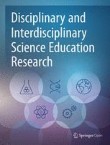Disciplinary and Interdisciplinary Science Education Research is affiliated with the Faculty of Education, Beijing Normal University.
Irish secondary school science teachers’ perspectives on addressing the COVID-19 crisis as socioscientific issues
Development of scientific literacy is a crucial aim of science education across the globe and research suggests that this can be realized through student exploration of socioscientific issues. While the COVID-...
